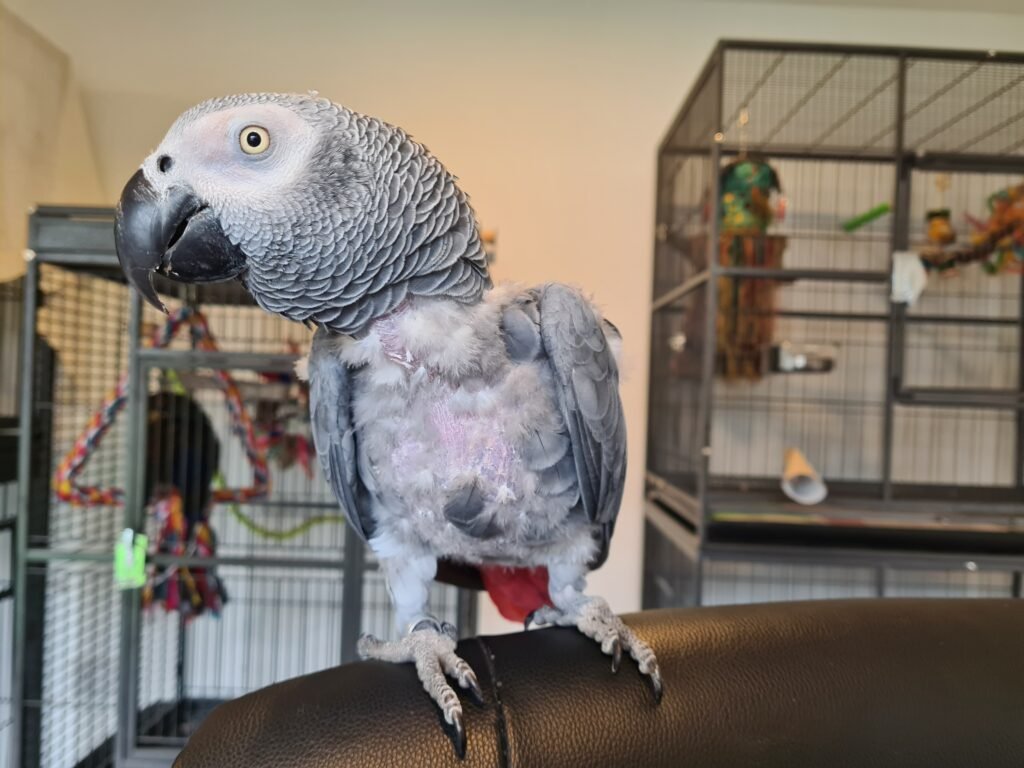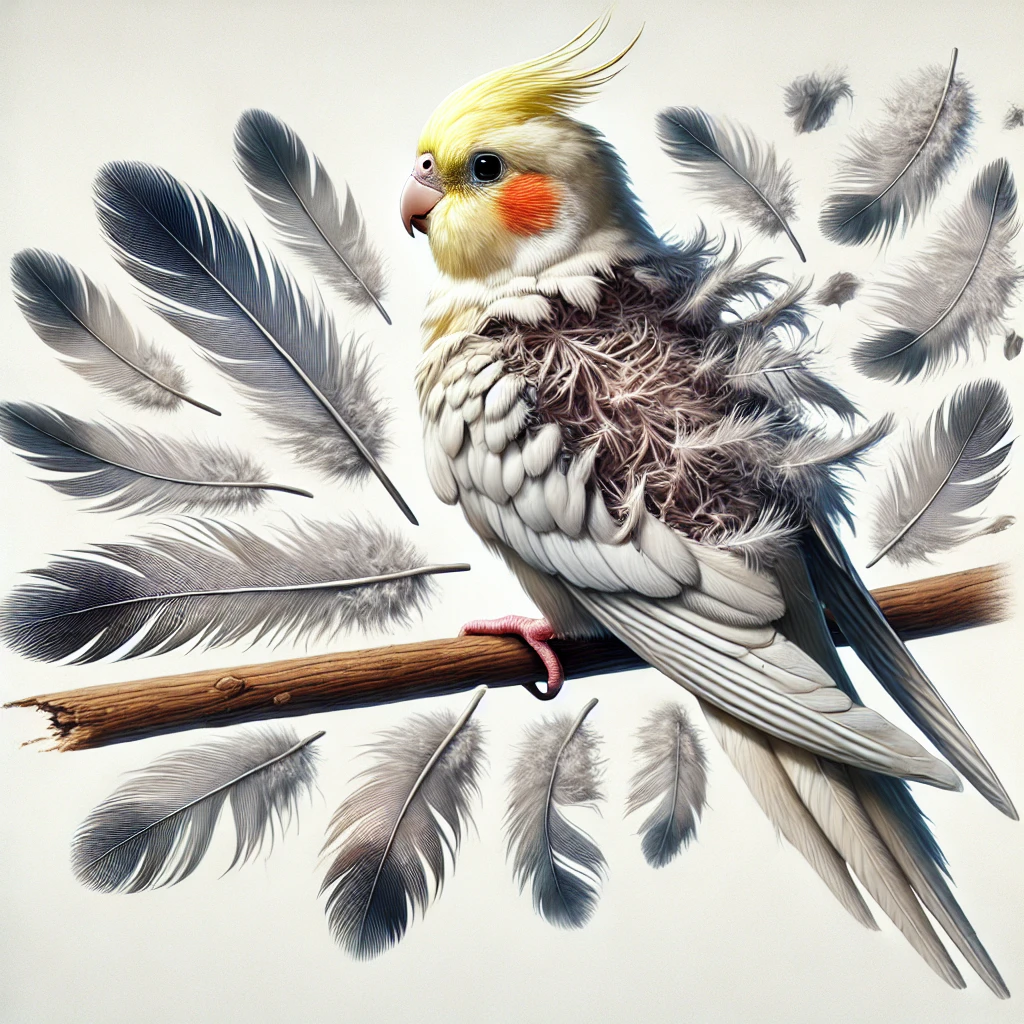Feather plucking is a complex and often distressing behavior seen in parrots, especially African Greys. If your parrot is plucking its feathers, you’re not alone; it’s a common issue with numerous potential causes. Understanding why your parrot may be plucking and taking steps to address it can improve your bird’s well-being significantly. This article will guide you through some of the best ways to tackle this behavior effectively and compassionately.
This article contains affiliate links. Purchasing items via these links allows us to earn a small commission at no additional cost to you. A portion of any profits made will go to support our rescue birds (food, heating costs etc.). We will not recommend any products that we don’t have personal experience with.

Feather plucking can have multiple causes, ranging from medical issues to psychological stress. The key to solving the problem is to identify the root cause. Common reasons include:
Medical Issues: Skin infections, parasites, allergies, or nutritional deficiencies can contribute to feather plucking. A visit to an avian vet is crucial to rule out these potential medical factors.
Behavioural and Emotional Factors: Parrots are highly intelligent and social birds. Boredom, lack of mental stimulation, loneliness, or even past trauma can trigger feather plucking. For rescue birds, the problem may have begun due to a history of neglect or unstable environments.
Environmental Factors: A lack of environmental enrichment, improper cage size, or even inadequate lighting can lead to plucking as parrots try to cope with their surroundings.
Understanding which of these factors might be affecting your parrot is the first step towards effectively addressing the behaviour.
Parrots, particularly rescue birds, often thrive on routine. Birds that have experienced chaotic or unstable environments benefit greatly from a sense of predictability. Establishing consistent feeding times, socialisation, and a daily schedule can help reduce anxiety. A calm and secure environment is the foundation for reducing stress-related behaviours like feather plucking.
Parrots are intelligent and active creatures that require significant mental stimulation to stay healthy and happy. One of the most effective ways to reduce feather plucking is to keep their minds and beaks busy. Enrichment activities, such as:
Providing activities that mimic natural behaviours can be very helpful in diverting their focus away from plucking.
Rescue birds, in particular, may have experienced traumatic situations, making them fearful or distrustful of humans. Rebuilding trust is a slow process that requires patience and gentleness. Start with small interactions:

Parrots have a natural instinct to preen, and habitual pluckers sometimes need a positive outlet for this behaviour. Providing preening toys, such as rope toys or pieces of soft material attached to their perch, can offer them a safer way to satisfy the urge to preen without damaging their own feathers.
Note: Always ensure that the materials used are safe and cannot be ingested, as some fibres or small pieces can cause crop blockages if swallowed.
Lighting plays an essential role in a parrot’s physical and mental health. In the UK, where natural daylight hours can vary significantly throughout the year, ensuring your parrot gets the right lighting is especially crucial.
Full-Spectrum Lighting: Parrots need exposure to UV light, which is important for vitamin D synthesis, calcium absorption, and overall mood. In the UK, especially during winter months, natural sunlight may be insufficient. Installing full-spectrum UVB bird lights that mimic natural sunlight is highly recommended. A good option is the Zoo Med AFL-10 AvianSun Deluxe Floor Lamp, which provides essential UVB light and is easy to position near your parrot’s cage. These lights help maintain healthy feather growth and support immune system function.
Lighting Schedule: Maintaining a consistent day-night cycle is crucial for a parrot’s well-being. In the UK, during winter, daylight hours can be very short. To keep your parrot on a proper schedule:
Avoid Sudden Changes: Sudden shifts in lighting schedules can lead to stress and feather plucking. Maintain a steady routine with gradual changes to mimic natural transitions between day and night.
By providing the right type and amount of light, you can help balance your parrot’s hormones and reduce stress levels, which are often contributors to feather plucking.
Training is an effective tool to help replace negative habits with positive ones. Using positive reinforcement can be a game-changer. Train your parrot to perform simple tricks, such as touching a target stick or waving, and reward these behaviours with treats and praise. Over time, this helps the bird learn new, positive ways to engage with its environment, gradually reducing the frequency of feather plucking.
Behaviourist Lara Joseph often recommends taking small, achievable steps. If your parrot can focus its energy on something rewarding, such as learning a trick or solving a puzzle, it can start to break the cycle of habitual plucking.
A well-balanced diet is crucial for a parrot’s overall health and feather quality. Plucking may be linked to nutritional deficiencies, such as a lack of essential fatty acids or vitamins A and D3. Ensure your parrot’s diet includes:
Consulting an avian veterinarian about specific nutritional needs or supplements, such as omega-3 and omega-6 fatty acids, can help address dietary gaps that may contribute to feather plucking. Dr. Greg Harrison, a renowned avian nutritionist, has often emphasised the importance of a balanced diet for feather health.
African Grey parrots are highly social and can become lonely if they don’t get enough interaction. Loneliness is a common trigger for plucking. Consider how much quality time you spend with your parrot each day:
If you’ve tried various strategies and there’s still no improvement, consult a certified avian behaviourist. They can provide insights based on your parrot’s specific situation and suggest tailored interventions that you may not have considered.
Feather plucking in parrots, especially those with a history of trauma or neglect, can be a deeply ingrained behaviour. Addressing this issue requires a combination of environmental enrichment, consistent routines, positive reinforcement, and patience. There is no quick fix; instead, it’s about gradually helping your parrot feel secure, stimulated, and healthy.
Remember, your parrot’s feather plucking developed over time, often as a coping mechanism for stress or boredom. Breaking this cycle takes dedication, empathy, and often professional support. With a consistent approach focused on improving the bird’s quality of life, many parrots do eventually reduce or stop plucking entirely, leading to a happier and healthier companion for you to enjoy.
